
CHINESE JOURNAL OF ORGANIC CHEMISTRY
Scope & Guideline
Fostering Scholarly Exchange in Organic Chemistry
Introduction
Aims and Scopes
- Synthesis of Organic Compounds:
The journal publishes research on the development and optimization of synthetic methods for organic compounds, including novel synthesis pathways and reactions. - Characterization Techniques:
Papers often include detailed characterization of synthesized compounds using various spectroscopic and analytical techniques, providing insights into molecular structures and properties. - Applications in Material Science:
Research articles frequently explore the applications of organic compounds in material science, including the development of organic semiconductors, sensors, and fluorescent materials. - Catalysis and Reaction Mechanisms:
The journal emphasizes studies related to catalytic processes, including both transition metal-catalyzed and organocatalytic reactions, highlighting the mechanisms and efficiency of these transformations. - Fluorescent Probes and Sensing Applications:
There is a notable focus on the design and synthesis of fluorescent probes for biological and environmental sensing applications, with a strong emphasis on aggregation-induced emission (AIE) properties. - Green Chemistry and Sustainable Practices:
The journal includes research on environmentally friendly synthetic methodologies, promoting the principles of green chemistry in organic synthesis.
Trending and Emerging
- Aggregation-Induced Emission (AIE):
A significant increase in research related to AIE materials has been observed, focusing on their applications in bioimaging and sensing, reflecting a growing interest in luminescent materials. - Electrochemical Synthesis:
There is a rising trend in the exploration of electrochemical methods for organic synthesis, highlighting the advantages of sustainability and efficiency in chemical processes. - Photocatalytic Reactions:
The journal has seen an uptick in studies related to photocatalysis, indicating a shift towards harnessing light for organic transformations and the development of new materials. - Organocatalysis:
Research on organocatalytic processes has gained momentum, with an emphasis on developing environmentally friendly and efficient catalytic systems. - Bioconjugation and Drug Development:
Emerging themes in bioconjugation techniques for drug development and delivery systems are increasingly prevalent, reflecting a focus on medicinal chemistry and therapeutic applications. - Synthetic Methodology Innovations:
Innovative synthetic methodologies, including new reaction conditions and catalysts, are trending, showcasing the journal's commitment to advancing organic synthesis techniques.
Declining or Waning
- Traditional Organic Synthesis Methods:
There appears to be a decline in the publication of studies focused solely on traditional organic synthesis methods, as researchers increasingly favor innovative and efficient alternatives. - Inorganic-Organic Hybrid Systems:
Research on hybrid systems that combine organic compounds with inorganic materials has decreased, possibly due to a shift in focus towards purely organic or more integrated systems. - Classical Reaction Mechanisms:
Papers detailing classical reaction mechanisms without significant new insights or applications have become less common, indicating a move towards more complex and novel reaction pathways. - Non-Functionalized Organic Compounds:
The synthesis and study of non-functionalized organic compounds have waned, with a growing emphasis on functionalized derivatives that offer more practical applications in various fields. - Basic Organic Chemistry Education:
There is a noticeable reduction in articles aimed at basic organic chemistry education, as the journal shifts towards more advanced research topics.
Similar Journals
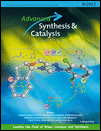
ADVANCED SYNTHESIS & CATALYSIS
Catalyzing the future of synthetic chemistry.ADVANCED SYNTHESIS & CATALYSIS is a prestigious academic journal published by Wiley-VCH Verlag GmbH, based in Germany. This journal, with ISSN 1615-4150 and E-ISSN 1615-4169, plays a pivotal role in the fields of Chemistry and Chemical Engineering, earning commendable rankings such as Q2 in Catalysis and Q1 in Organic Chemistry in 2023. Its high impact factor and recognition—ranking #18 in both Organic Chemistry and Catalysis—further underscore its significance as a platform for groundbreaking research and innovative methodologies. Spanning from 1996 through 2024, ADVANCED SYNTHESIS & CATALYSIS aims to disseminate high-quality, cutting-edge studies related to synthetic processes and catalytic technologies, ensuring accessibility via their open access options. By fostering a vibrant scholarly community, this journal serves as an essential resource for researchers, professionals, and students dedicated to driving advancements in synthetic and catalytic chemistry.

RUSSIAN CHEMICAL REVIEWS
Exploring the Depths of Chemical KnowledgeRUSSIAN CHEMICAL REVIEWS, published by the esteemed ND Zelinsky Institute of Organic Chemistry, RAS, stands as a prominent platform for disseminating high-quality research in the diverse field of chemistry. With an ISSN of 0036-021X and an E-ISSN of 1468-4837, this journal has earned its place in the Q1 quartile of Chemistry (miscellaneous) for 2023, reflecting its outstanding impact and rigorous peer-review process. The journal encompasses a wide array of topics within chemistry, providing critical reviews that advance understanding and foster collaboration among researchers, professionals, and students globally. With its consistent publication since 1970, RUSSIAN CHEMICAL REVIEWS not only serves as a valuable resource for the latest advancements in the field but also plays a crucial role in shaping future research directions. The journal is based in the Russian Federation, with its office located at 47 Leninsky Pr, Moscow 119991, RUSSIA. As an essential reference for those in the chemical sciences, it provides an ideal avenue for authors looking to publish impactful reviews that contribute to the broader scientific community.
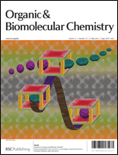
ORGANIC & BIOMOLECULAR CHEMISTRY
Advancing the frontiers of organic and biomolecular science.ORGANIC & BIOMOLECULAR CHEMISTRY is a prestigious academic journal published by the Royal Society of Chemistry, dedicated to advancing the fields of organic and biomolecular chemistry. With its ISSN of 1477-0520 and E-ISSN of 1477-0539, this journal plays a pivotal role in disseminating high-quality research and contributing to the scientific community, particularly in biochemistry, organic chemistry, and physical and theoretical chemistry. Currently ranked in the third quartile for Biochemistry and the second quartile for Organic Chemistry and Physical and Theoretical Chemistry, it caters to a diverse audience of researchers, professionals, and students who seek insightful studies and reviews. With a publication history spanning since 2003 and ongoing till 2024, the journal fosters open access to its articles, encouraging the free exchange of knowledge. Situated in the vibrant academic environment of Cambridge, UK, ORGANIC & BIOMOLECULAR CHEMISTRY serves as a vital resource for innovative research at the intersection of chemical sciences.
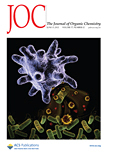
JOURNAL OF ORGANIC CHEMISTRY
Elevating Research Standards in Organic ChemistryJournal of Organic Chemistry, published by the American Chemical Society, is a prestigious peer-reviewed journal dedicated to advancing the field of organic chemistry. With an ISSN of 0022-3263 and an E-ISSN of 1520-6904, this journal has established itself as a key platform for disseminating high-quality research since its inception in 1936. Residing in the Q2 category for Organic Chemistry as of 2023, it ranks #64 out of 211 in Scopus, positioning itself within the top 69th percentile of its field. Researchers and professionals can access vital findings and innovative methodologies that drive the understanding and application of organic chemical principles. Although the journal is not open access, it remains a crucial resource in academia and industry, contributing significantly to the scientific community's knowledge base. For detailed insights and cutting-edge research, the journal continues to be an essential read for those engaged in the dynamic and evolving landscape of organic chemistry.
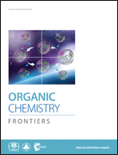
Organic Chemistry Frontiers
Pioneering pathways in organic chemistry excellence.Welcome to Organic Chemistry Frontiers, a premier academic journal published by the Royal Society of Chemistry, dedicated to advancing the field of organic chemistry. With an impressive Q1 ranking in the 2023 category of Organic Chemistry and a notable Scopus rank of 34 out of 211, this journal provides a vital platform for researchers and professionals to disseminate innovative research, cutting-edge methodologies, and comprehensive reviews. Serving as an open-access journal, Organic Chemistry Frontiers aims to enhance the visibility and accessibility of critical research findings in the organic chemistry domain, fostering collaboration and dialogue among scientists worldwide. Since its inception in 2014, it has consistently published high-quality articles that contribute to the progression of knowledge and application in organic chemistry, establishing itself as a cornerstone for students and scholars striving to deepen their understanding and drive forward their research endeavors.

ARKIVOC
Empowering Researchers with Accessible Organic Chemistry InsightsARKIVOC is an esteemed open-access journal dedicated to the field of Organic Chemistry, published by ARKAT USA INC. Since its inception in 2000, ARKIVOC has aimed to disseminate high-quality research and advancements in organic chemistry, fostering an international exchange of knowledge within this ever-evolving discipline. With its ISSN 1551-7004 and E-ISSN 1551-7012, the journal is committed to providing accessible content free of charge to researchers, students, and professionals around the globe. Although currently categorized in the fourth quartile of Organic Chemistry with a Scopus rank of #188 out of 211, ARKIVOC continues to encourage the publication of innovative works and critical reviews that highlight emerging trends and methodologies in organic synthesis, reaction mechanisms, and material sciences. Its open-access model since 2000 ensures that valuable contributions to scientific knowledge are widely available, promoting collaboration and discovery. The journal is based in the United States, with its editorial office located at the University of Florida, under the guidance of prominent chemists. ARKIVOC provides an essential platform for those deeply engaged in organic chemistry research, supporting the advancement of science for future generations.

RUSSIAN JOURNAL OF GENERAL CHEMISTRY
Advancing the Frontiers of General ChemistryThe Russian Journal of General Chemistry is a prominent scholarly publication dedicated to advancing the field of general chemistry. Published by MAIK NAUKA/INTERPERIODICA/SPRINGER, this journal contributes significantly to the global chemistry landscape, offering a platform for researchers and professionals to share their latest findings and methodologies. With an ISSN of 1070-3632 and an E-ISSN of 1608-3350, it has established itself as a resource for high-quality research articles since its inception in 1996. Though currently indexed in the Q4 category for chemistry (miscellaneous) and ranking #299 out of 408 in general chemistry according to Scopus, the journal remains an important venue for academic contributions that bridge gaps in traditional chemical disciplines. Desiring to cater to a diverse range of interests within chemistry, the journal actively encourages submissions that reflect significant scientific achievements, innovations, and collaborative studies. Although the journal does not currently offer open access, its role in disseminating crucial chemical research cannot be overstated. Researchers and students alike will find valuable insights and rigorous scientific discourse in its pages.
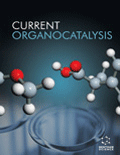
Current Organocatalysis
Advancing the Frontiers of OrganocatalysisCurrent Organocatalysis is a premier academic journal dedicated to the dynamic field of organocatalysis, published by Bentham Science Publishers, Ltd. Based in the United Arab Emirates, this journal has been a valuable resource for researchers since its inception in 2014 and will continue to publish impactful articles until 2024. The journal provides a platform for sharing groundbreaking research, reviews, and insights that significantly contribute to the fields of Analytical Chemistry, Catalysis, and Organic Chemistry. With a Q4 ranking in several chemistry categories, it identifies and disseminates emerging strategies and methodologies in organocatalysis, promoting collaboration and advancement in the community. While it operates on a subscription basis, the journal ensures accessible content for its audience to further supplement academic learning and professional development. Researchers, professionals, and students are encouraged to explore and contribute to this critical field, leveraging the journal as an essential resource for the latest trends and innovations in organocatalysis.
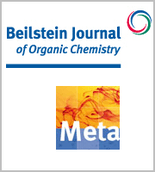
Beilstein Journal of Organic Chemistry
Pioneering cutting-edge research in organic chemistry.The Beilstein Journal of Organic Chemistry, published by the renowned BEILSTEIN-INSTITUT, stands as a pivotal platform for advancing the field of organic chemistry since its inception in 2005. With its commitment to Open Access publishing, this journal enables global readership and collaboration, fostering the dissemination of high-quality research. Operating from Germany, the journal has carved out a significant reputation, currently holding a Q2 ranking in the Organic Chemistry category, with impressive Scopus rankings placing it at #91 out of 211 in the field, achieving a 57th percentile. The Beilstein Journal is dedicated to publishing cutting-edge findings that span the breadth of organic chemistry, including synthetic methodologies, catalysis, and material sciences, making it an essential resource for researchers, professionals, and students looking to stay at the forefront of organic chemistry advancements. With a vision to enhance collaboration and knowledge sharing within the scientific community, the journal plays a vital role in shaping the future of organic chemistry research.

INDIAN JOURNAL OF CHEMISTRY
Fostering a Community of Knowledge in the Chemical SciencesINDIAN JOURNAL OF CHEMISTRY, published by the NATL INST SCIENCE COMMUNICATION & POLICY RESEARCH (NIScPR), stands as a vital platform for disseminating innovative research and advancements in the fields of organic, inorganic, and physical chemistry. With its inception in 1969, this journal has served the global community of chemists and researchers, contributing significantly to the advancement of chemical sciences in India and beyond. The journal maintains a strong commitment to open access, facilitating widespread dissemination of knowledge, allowing readers from diverse backgrounds to access cutting-edge research without barriers. Although coverage in Scopus has been temporarily discontinued, the journal continues to uphold rigorous scholarly standards, making it an authoritative source for academicians, professionals, and students alike. Readers can expect high-quality articles that reflect the latest developments and discoveries in chemistry, reinforcing the journal's reputation as an essential resource in the scientific community.